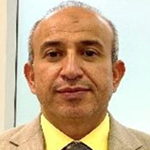
Dr Mohammed Alkhaldi
Scientific lead and regional coordinator of the TGHN MENA
Assistant Professor of Global Health, Canadian University Dubai
 Dr. Mohammed Alkhaldi holds a Doctorate in Public Health from the Swiss TPH, affiliated with the University of Basel. With over 15 years of experience in global public health, he has led multinational health research system (HRS) analyses across the MENA region and has contributed significantly to three core sectors; supporting public sector health policy development; teaching and conducting public health research; and leading and contributing to initiatives in the private and NGO sectors. Dr. Alkhaldi’s expertise spans several areas, including global health governance, HPSR, digital health technologies and innovation, HTA, evidence-informed policymaking, health research systems, and health systems in humanitarian settings. Throughout his career, he has held leadership and advisory roles with prestigious organizations such as WHO, COHRED, HSG, Swiss TPH, McGill University, CAGH, CSIH, E4GH, UNICEF, Davos Alzheimer’s Collaborative, RKI, and LMH. Dr. Alkhaldi’s contributions to the field have been recognized through his involvement on editorial boards of international journals, invitations to lecture in nearly 30 countries, and the publication of over 50 works—including scientific articles, book chapters, policy reports, and pieces in popular media. Currently, he is a Visiting Fellow at McGill University, where he leads collaborative research projects on HTA, digital health technologies, learning health systems, and value-based healthcare in HMLICs. He has also served as a regional consultant for WHO-EMRO and UNICEF-MENARO, supporting the development of hospital readiness and primary healthcare strategies in emergency contexts. From 2020 to 2023, he served as a WHO-UHPR TAG expert, advising WHO-HQ on the UHPR process to enhance Member States' preparedness capacities. Additionally, Dr. Alkhaldi worked as a global health consultant with the RKI, where he led a scoping review on global public health surveillance initiatives. Currently, he serves as an Assistant Professor at Canadian University Dubai, leading research projects and teaching global public health courses. He is also the Scientific Lead and Regional Coordinator for both the TGHN MENA Network and the AI in Global Health Project, hosted at Canadian University Dubai and affiliated with the University of Oxford’s Nuffield Department of Medicine.
Dr. Mohammed Alkhaldi holds a Doctorate in Public Health from the Swiss TPH, affiliated with the University of Basel. With over 15 years of experience in global public health, he has led multinational health research system (HRS) analyses across the MENA region and has contributed significantly to three core sectors; supporting public sector health policy development; teaching and conducting public health research; and leading and contributing to initiatives in the private and NGO sectors. Dr. Alkhaldi’s expertise spans several areas, including global health governance, HPSR, digital health technologies and innovation, HTA, evidence-informed policymaking, health research systems, and health systems in humanitarian settings. Throughout his career, he has held leadership and advisory roles with prestigious organizations such as WHO, COHRED, HSG, Swiss TPH, McGill University, CAGH, CSIH, E4GH, UNICEF, Davos Alzheimer’s Collaborative, RKI, and LMH. Dr. Alkhaldi’s contributions to the field have been recognized through his involvement on editorial boards of international journals, invitations to lecture in nearly 30 countries, and the publication of over 50 works—including scientific articles, book chapters, policy reports, and pieces in popular media. Currently, he is a Visiting Fellow at McGill University, where he leads collaborative research projects on HTA, digital health technologies, learning health systems, and value-based healthcare in HMLICs. He has also served as a regional consultant for WHO-EMRO and UNICEF-MENARO, supporting the development of hospital readiness and primary healthcare strategies in emergency contexts. From 2020 to 2023, he served as a WHO-UHPR TAG expert, advising WHO-HQ on the UHPR process to enhance Member States' preparedness capacities. Additionally, Dr. Alkhaldi worked as a global health consultant with the RKI, where he led a scoping review on global public health surveillance initiatives. Currently, he serves as an Assistant Professor at Canadian University Dubai, leading research projects and teaching global public health courses. He is also the Scientific Lead and Regional Coordinator for both the TGHN MENA Network and the AI in Global Health Project, hosted at Canadian University Dubai and affiliated with the University of Oxford’s Nuffield Department of Medicine.
Khaled Al-Surimi, PhD
University of Doha for Science and Technology, Qatar
Khaled Al-Surimi, PhD, MPH, PgDip, is a professor of healthcare management and public health and Head of Department at the University of Doha for Science and Technology, Qatar. Prof. Al-Surimi earned his Ph.D. in Public Health and Health Systems Management from Liverpool School of Tropical Medicine at the University of Liverpool, UK.
Throughout his extensive academic journey spanning over 20 years and experience in public health and health policy and management, he has made significant contributions to the field over the course of his career. Prof. Al-Surimi has held various esteemed positions, leveraging his expertise to advance the domains of public health and healthcare management. His commitment to excellence in education and research is evident in his substantial body of work, which includes over 100 peer-reviewed publications. Prof. Al-Surimi's research contributions have garnered significant recognition, with a considerable number of citations underscoring the impact of his work on public health and healthcare management.
Ilham Abu Khader, BSN, MSHS, MPH, D.Ed, CIC
Senior technical specialist for the Capacity building team at Eastern Mediteranean Public Health Network (EMPHNET)
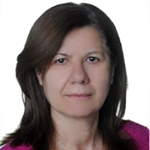 Ilham Abu Khader, BSN, MSHS, MPH, D.Ed, CIC, is a certified nurse, infection control and data analysis specialist with more than 35 years of extensive technical and management of public health projects. Currently, she works as a senior technical specialist for the Capacity building team at Eastern Mediteranean Public Health Network (EMPHNET). Within her position, she is handling the technical and administrative details of various projects and the field epidemiology training program (FETP) in different countries in the Middle East and North Africa (MENA) region. In addition to being a certified nurse and infection control, Ms Ilham holds a Masters of Science in Health Service Management from Yarmouk University in Jordan (2007) and master's in public health from the American University in Beirut (1983), higher Diploma in Education School education from the University of Jordan in 1997. She holds the Certification Board of Infection Control and Epidemiology (CIC) and she was the Hygiene Promotion Team Leader for World Vision, and the Assistant General Director for the Jordan University Hospital in Amman.
Ilham Abu Khader, BSN, MSHS, MPH, D.Ed, CIC, is a certified nurse, infection control and data analysis specialist with more than 35 years of extensive technical and management of public health projects. Currently, she works as a senior technical specialist for the Capacity building team at Eastern Mediteranean Public Health Network (EMPHNET). Within her position, she is handling the technical and administrative details of various projects and the field epidemiology training program (FETP) in different countries in the Middle East and North Africa (MENA) region. In addition to being a certified nurse and infection control, Ms Ilham holds a Masters of Science in Health Service Management from Yarmouk University in Jordan (2007) and master's in public health from the American University in Beirut (1983), higher Diploma in Education School education from the University of Jordan in 1997. She holds the Certification Board of Infection Control and Epidemiology (CIC) and she was the Hygiene Promotion Team Leader for World Vision, and the Assistant General Director for the Jordan University Hospital in Amman.
Dr. Mohamed Elhadidy
Professor of Biomedical Sciences, director of Center for Genomics (CG) and Vice Director of Teaching Effectiveness Office (TEO) at Zewail City of Science and Technology, Egypt
 Dr. Mohamed Elhadidy is currently a professor of Biomedical Sciences, director of Center for Genomics (CG) and Vice Director of Teaching Effectiveness Office (TEO) at Zewail City of Science and Technology, Egypt. Dr. Elhadidy holds a DVM degree from Mansoura University in Egypt. He obtained his master’s degree in 2006 in Microbiology from Mansoura University and obtained his PhD (2010) in Microbiology from Virginia Tech University, USA. Dr. Elhadidy served as a research scientist at School of Medicine, University of Saskatchewan, Canada; University of Bristol, UK; and University of Gent and Scientific Institute of Public health in Belgium. In 2018, he also served as a visiting professor at University of Bath, UK. Dr. Elhadidy is a current member of the and National Microbiology Council, a former exclusive committee member and former chair from the selection committee of the Global Young Academy, Young academy of Sciences (EYAS), and a former member of committee of National Academy of Sciences, USA to develop framework of faculty members in MENA region and Egypt who are better able to teach issues related to the responsible conduct of science by combining tenets of active learning pedagogical techniques.
Dr. Mohamed Elhadidy is currently a professor of Biomedical Sciences, director of Center for Genomics (CG) and Vice Director of Teaching Effectiveness Office (TEO) at Zewail City of Science and Technology, Egypt. Dr. Elhadidy holds a DVM degree from Mansoura University in Egypt. He obtained his master’s degree in 2006 in Microbiology from Mansoura University and obtained his PhD (2010) in Microbiology from Virginia Tech University, USA. Dr. Elhadidy served as a research scientist at School of Medicine, University of Saskatchewan, Canada; University of Bristol, UK; and University of Gent and Scientific Institute of Public health in Belgium. In 2018, he also served as a visiting professor at University of Bath, UK. Dr. Elhadidy is a current member of the and National Microbiology Council, a former exclusive committee member and former chair from the selection committee of the Global Young Academy, Young academy of Sciences (EYAS), and a former member of committee of National Academy of Sciences, USA to develop framework of faculty members in MENA region and Egypt who are better able to teach issues related to the responsible conduct of science by combining tenets of active learning pedagogical techniques.
Haytham Abusenjar
Islamic University of Gaza and the Turkish Palestinian Friendship Hospital Gaza, Palestine
Haytham Abusenjar holds a bachelor's degree in nursing from Palestine College of Nursing in Gaza and has seven years of clinical experience working as a cancer nurse at the European Gaza Hospital and the Turkish Palestinian Friendship Hospital (Gaza Cancer Center). He is also a fellow of cancer research in conflict settings at the Global Health Institute, American University of Beruti. Currently, he is pursuing an MSc in Palliative Care at King's College London, UK. His research interests include cancer, palliative and end of life care.
Dr. Wissam Ghach, Ph.D.
Associate professor of Chemical and Biological Sciences at Department of Public Health, Canadian University Dubai, UAE
 Wissam Ghach holds a Ph.D. degree in chemistry from the University of Lorraine - France, and he was heading the department of Research and Innovation at the Modern University for Business and Science Lebanon). Dr. Ghach is currently an associate professor of Chemical and Biological Sciences at Department of Public Health, Canadian University Dubai, UAE. His research focuses on Sol-gel based Bioelectrochemical Systems; prevalence of diseases and associated risk factors (behavioural, occupational, and indoor-environmental); and chemical awareness-safety (disinfectants, tobacco, cosmetic, and pesticide use) in the Middle Eastern countries.
Wissam Ghach holds a Ph.D. degree in chemistry from the University of Lorraine - France, and he was heading the department of Research and Innovation at the Modern University for Business and Science Lebanon). Dr. Ghach is currently an associate professor of Chemical and Biological Sciences at Department of Public Health, Canadian University Dubai, UAE. His research focuses on Sol-gel based Bioelectrochemical Systems; prevalence of diseases and associated risk factors (behavioural, occupational, and indoor-environmental); and chemical awareness-safety (disinfectants, tobacco, cosmetic, and pesticide use) in the Middle Eastern countries.
Mahmoud Hilali, PhD
Assistant Professor of Epidemiology at the Blue Nile National Institute for Communicable Diseases, University of Gezira
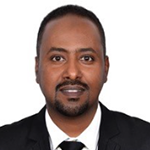 Mahmoud Hassan holds a Doctorate in Epidemiology from the University of Basel, the Swiss Tropical and Public Health Institute (Swiss TPH) and is an accomplished epidemiologist with a strong background in academia and public health programs. As an Assistant Professor of Epidemiology at the Blue Nile National Institute for Communicable Diseases, University of Gezira, Mahmoud has cultivated extensive experience in teaching and mentoring, curriculum design, and research collaboration. He is dedicated to advancing public health education and research, with expertise in leading epidemiological assessments, managing surveillance data, and formulating interventions to prevent/control diseases. He is also a founding investigator for MENA Migration Health Consortium.
Mahmoud Hassan holds a Doctorate in Epidemiology from the University of Basel, the Swiss Tropical and Public Health Institute (Swiss TPH) and is an accomplished epidemiologist with a strong background in academia and public health programs. As an Assistant Professor of Epidemiology at the Blue Nile National Institute for Communicable Diseases, University of Gezira, Mahmoud has cultivated extensive experience in teaching and mentoring, curriculum design, and research collaboration. He is dedicated to advancing public health education and research, with expertise in leading epidemiological assessments, managing surveillance data, and formulating interventions to prevent/control diseases. He is also a founding investigator for MENA Migration Health Consortium.
Marina Z. AlBada
M.Sc. student in Global Health Policy at The University of Edinburgh
 Marina Z. AlBada is an evidence-driven health policy expert with a robust foundation in clinical pharmacy and a dynamic background in scientific research, pharmaceutical market access, and public affairs management. She is currently an M.Sc. student in Global Health Policy at The University of Edinburgh, where her thesis focuses on the "Responsible artificial intelligence deployment in clinical practice: Emphasizing the importance of equity". Marina is currently the Asia Coordinator for the AI for Global Health Initiative, bringing her expertise to this impactful initiative. Marina's career includes roles such as the Policy and Public Affairs Manager for Novartis in the MEA region, where she was instrumental in shaping health policies, orchestrating public-private partnerships, and advocating for advanced therapies. Her career is marked by her ability to lead cross-functional teams, forge strategic partnerships, and navigate complex policy landscapes.
Marina Z. AlBada is an evidence-driven health policy expert with a robust foundation in clinical pharmacy and a dynamic background in scientific research, pharmaceutical market access, and public affairs management. She is currently an M.Sc. student in Global Health Policy at The University of Edinburgh, where her thesis focuses on the "Responsible artificial intelligence deployment in clinical practice: Emphasizing the importance of equity". Marina is currently the Asia Coordinator for the AI for Global Health Initiative, bringing her expertise to this impactful initiative. Marina's career includes roles such as the Policy and Public Affairs Manager for Novartis in the MEA region, where she was instrumental in shaping health policies, orchestrating public-private partnerships, and advocating for advanced therapies. Her career is marked by her ability to lead cross-functional teams, forge strategic partnerships, and navigate complex policy landscapes.
Majdouline OBTEL, MD, MPH, PhD
Head of Pedagogy and research Unit of Community Medicine and Public Health & Professor in Epidemiology, Biostatistics and Public Health in Department of Public Health in Faculty of Medicine and Pharmacy of Mohammed V University in Rabat, Morocco
 Majdouline OBTEL, MD, MPH, PhD, is the head of Pedagogy and research Unit of Community Medicine and Public Health & Professor in Epidemiology, Biostatistics and Public Health in Department of Public Health in Faculty of Medicine and Pharmacy of Mohammed V University in Rabat, Morocco.
Majdouline OBTEL, MD, MPH, PhD, is the head of Pedagogy and research Unit of Community Medicine and Public Health & Professor in Epidemiology, Biostatistics and Public Health in Department of Public Health in Faculty of Medicine and Pharmacy of Mohammed V University in Rabat, Morocco.
From 2011 to now, tutoring medical students and scientist participants subscribed in The University Diploma of Practical Methods in Epidemiology, ISEPD, Victor Segalen University, Bordeaux, France. She has worked as medical epidemiologist in charge of Epidemiological Research; Epidemic intelligence and Event based surveillance; Early warning, Risk Assessment of Acute public health events; Surveillance and alert of emerging diseases (Ebola, MERSCOV, etc.). She has also been working as a WHO consultant in her areas of public health expertise.
Slimane BenMiled
University Professor
 As a biomathematician, Slimane Ben Miled has served as both a professor and the head of the Laboratory of Bioinformatics, Biomathematics, and Biostatistics at the Pasteur Institute of Tunis, which was co-founded by him in 2016. Extensive research has been conducted by him, focusing on mathematical modeling in epidemiology and population dynamics, with a particular emphasis on public health. In his role as a university professor, several initiatives to promote biomathematics in Tunisia have been spearheaded by Slimane Ben Miled. These include the organization of summer schools to introduce biologists to mathematical tools and the creation of a master's degree program in Information Processing and the Complexity of Life at the University of Tunis El Manar to encourage engineering sciences students to pursue biology. Additionally, numerous projects (e.g., European projects, Pasteur network collaborations, international collaborations) have been successfully led by him as the principal investigator or co-investigator.
As a biomathematician, Slimane Ben Miled has served as both a professor and the head of the Laboratory of Bioinformatics, Biomathematics, and Biostatistics at the Pasteur Institute of Tunis, which was co-founded by him in 2016. Extensive research has been conducted by him, focusing on mathematical modeling in epidemiology and population dynamics, with a particular emphasis on public health. In his role as a university professor, several initiatives to promote biomathematics in Tunisia have been spearheaded by Slimane Ben Miled. These include the organization of summer schools to introduce biologists to mathematical tools and the creation of a master's degree program in Information Processing and the Complexity of Life at the University of Tunis El Manar to encourage engineering sciences students to pursue biology. Additionally, numerous projects (e.g., European projects, Pasteur network collaborations, international collaborations) have been successfully led by him as the principal investigator or co-investigator.
One recent project overseen by Slimane Ben Miled as the principal investigator was the modeling package for the International Pasteurian Research Program in Response to Coronavirus in Africa (REPAIR) project, aimed at understanding the COVID-19 epidemic in Africa. Membership in the scientific committee of the Pasteur Institute of Tunis and the COVID-19 crisis and modeling committees for the Ministry of Health in Tunisia was also held by him until August 2021.
Moreover, Slimane Ben Miled is a member of the Council of the Complex Dynamical System UNITWIN-UNESCO and the Ovide Arino Prize Awarding Committee (a joint prize of the French Speaking Society of Theoretical Biology and the European Society for Mathematical and Theoretical Biology).
Maryam Wakkaf
Project Assistant at UNDP Syria
 With over three years of experience in the humanitarian sector, Maryam Wakkaf is currently a Project Assistant at UNDP Syria, working on the Local Governance and Community Resilience Project. She holds a BSc in Pharmacy and is enrolled in a postgraduate diploma in Global Health Research at the University of Oxford. Maryam is also a member of the technical working group for the Global Health Network in the MENA region. Her work at UNDP focuses on development and local governance initiatives spanning various areas of intervention. In her role with the Global Health Network, she focuses on establishing partnerships in Syria to enhance health research, which she believes is fundamental to development. With a background in communication, Maryam strongly believes in the power of effective communication and promotion in both health and development. She is dedicated to contributing to the sustainable development of Syria through improved health research, effective communication, and community resilience initiatives.
With over three years of experience in the humanitarian sector, Maryam Wakkaf is currently a Project Assistant at UNDP Syria, working on the Local Governance and Community Resilience Project. She holds a BSc in Pharmacy and is enrolled in a postgraduate diploma in Global Health Research at the University of Oxford. Maryam is also a member of the technical working group for the Global Health Network in the MENA region. Her work at UNDP focuses on development and local governance initiatives spanning various areas of intervention. In her role with the Global Health Network, she focuses on establishing partnerships in Syria to enhance health research, which she believes is fundamental to development. With a background in communication, Maryam strongly believes in the power of effective communication and promotion in both health and development. She is dedicated to contributing to the sustainable development of Syria through improved health research, effective communication, and community resilience initiatives.
Prof. Abdelraouf A. Elmanama
Islamic University of Gaza
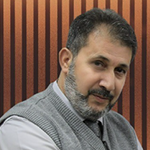 Prof. Abdelraouf A. Elmanama holds a Ph. D degree in microbiology from Ain-Shams- Alaqsa joint program (2004), M.Sc. in microbiology from University of Santo Tomas, Philippines (1993) and B.Sc. Medical Technology from Southwestern University, Philippines (1990). Currently, working as a lecturer of general, diagnostic and environmental microbiology at the Medical Technology Departments of the Islamic University-Gaza and was a part time lecturer of Medical Microbiology at Al-Azhar college of Medicine and IUG. Dr. Elmanama was appointed by the British council as a credited trainer in food microbiology and HACCP system. He also conducted several training courses and workshops in the field of medical, food and water microbiology. He was appointed for several committees within the university and in the local government health departments. Main research interests include seawater pollution, antibiotic resistance, ethnobotany, drinking and wastewater. Researcher with more than 20 years of experience teaching courses in both undergraduate and postgraduate levels. Supervised BSc. theses, MSc. theses, and Ph.D. dissertations. Published more than 60 articles in peer-reviewed journals.
Prof. Abdelraouf A. Elmanama holds a Ph. D degree in microbiology from Ain-Shams- Alaqsa joint program (2004), M.Sc. in microbiology from University of Santo Tomas, Philippines (1993) and B.Sc. Medical Technology from Southwestern University, Philippines (1990). Currently, working as a lecturer of general, diagnostic and environmental microbiology at the Medical Technology Departments of the Islamic University-Gaza and was a part time lecturer of Medical Microbiology at Al-Azhar college of Medicine and IUG. Dr. Elmanama was appointed by the British council as a credited trainer in food microbiology and HACCP system. He also conducted several training courses and workshops in the field of medical, food and water microbiology. He was appointed for several committees within the university and in the local government health departments. Main research interests include seawater pollution, antibiotic resistance, ethnobotany, drinking and wastewater. Researcher with more than 20 years of experience teaching courses in both undergraduate and postgraduate levels. Supervised BSc. theses, MSc. theses, and Ph.D. dissertations. Published more than 60 articles in peer-reviewed journals.
Yasir Elhadi
Research Assistant at United Arab Emirates University
 Yasir holds a master’s degree in public health with a focus on health systems, planning, and policy. He is currently a Research Assistant at United Arab Emirates University, a Program Manager and Team Lead in Health Policy Research at Global Health Focus (MENA), and an Associate Editor for Public Health Challenges and Frontiers in Public Health journals. Previously, he served as a Public Health Consultant at the National Center for Disease Control and the National Cancer Control Authority in Libya, and as a Research Assistant at Abu Dhabi University (UAE) and King Fahad Medical City (Saudi Arabia). He has also been a Research Advisor at the University of Khartoum and Omdurman Islamic University (Sudan). Yasir is an expert in healthcare management, health systems strengthening, health policy, and the monitoring and evaluation of public health programs. He has published over 40 papers and reviewed more than 115 manuscripts in leading scientific journals.
Yasir holds a master’s degree in public health with a focus on health systems, planning, and policy. He is currently a Research Assistant at United Arab Emirates University, a Program Manager and Team Lead in Health Policy Research at Global Health Focus (MENA), and an Associate Editor for Public Health Challenges and Frontiers in Public Health journals. Previously, he served as a Public Health Consultant at the National Center for Disease Control and the National Cancer Control Authority in Libya, and as a Research Assistant at Abu Dhabi University (UAE) and King Fahad Medical City (Saudi Arabia). He has also been a Research Advisor at the University of Khartoum and Omdurman Islamic University (Sudan). Yasir is an expert in healthcare management, health systems strengthening, health policy, and the monitoring and evaluation of public health programs. He has published over 40 papers and reviewed more than 115 manuscripts in leading scientific journals.
Dr. Ahmed Al-Saeedi
Health Information Systems Expert & Digital Health Leader
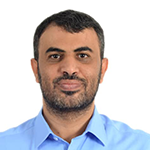
Public health specialist with 12+ years of experience in health information systems (HIS), digital health strategy, and healthcare quality. Currently serving as Director General of Information & Research at Yemen’s Ministry of Public Health and Population. Led the national rollout of DHIS2 and co-authored the 2024–2028 National HIS Strategy. Holds an MSc in Pharmacology and a BSc in Pharmacy, and is pursuing dual PhD programs in Community Medicine (Health Informatics) and Global Health. Actively involved in health research and evidence-based policymaking, having chaired Yemen’s National Research Ethics Committee and contributed to national studies. Passionate about AI in healthcare, digital transformation, and innovation in LMICs.
Rode Amsal Tarekegne
Rode Amsal Tarekegne is a young researcher currently completing her bachelor's in public health, majoring in environmental management in Canadian University of Dubai (UAE). She is a member of her university’s “Eco-lution” Society, where she engages in environmental preservation through volunteering. She has attended the second Abu Dhabi University (UAE) International Pharmacy and Biomedical sciences conference and the Future Food Forum conference in Dubai (UAE). Rode is currently the youngest member in The Global Health Network (TGHN) MENA region, notably contributing to the screening and authorship of the MENA regional health priorities in practice and research paper. Rode’s early contribution through the TGHN and MENA health prioritization research paper demonstrates her deep interest in global health and is a key figure to look-out for in future.
Sania Rahman
Sania Rahman is the youngest member of the MENA Global Health Network, where she has significantly contributed to the review, screening, and authorship of a comprehensive paper on regional priorities in health practice and research. A distinguished student at the Canadian University of Dubai, she is on track to graduate in 2026 with a degree in Public Health and Environmental Health Management, consistently earning top academic honors.
Her professional interests span a broad range of public health practices, with a particular focus on collaborative research. In her capacity as Vice President of the Student Society, Sania has demonstrated strong leadership skills, actively engaging in initiatives that enhance the student experience. She has also participated in numerous high-level conferences and projects across various sectors in the United Arab Emirates.
Sania’s deep commitment to advancing global health, combined with her academic excellence and active involvement in public health initiatives, positions her as an emerging leader in the field.
